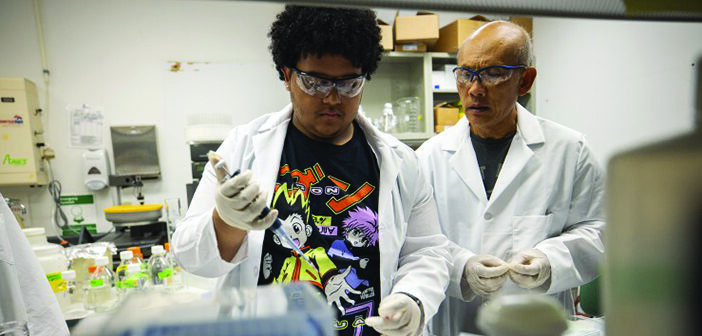Pathology summer program welcomes local teens to explore careers in science and research.
In seventh grade, Ailyn Mendoza ’27 developed a passion for science, and her curiosity for a career in the field continued as she advanced through high school.
“I’ve always had an interest in learning about illness and disease and how it affects the human body,” Mendoza says. “But I never wanted to be a primary care physician, and I thought, there has to be something else that I can do where I can still contribute to patients or public health—but just not in the role of an everyday doctor.”
During the summer before her senior year at Central Falls High School in 2022, Mendoza discovered that “something else.” Through an internship program at Brown’s Department of Pathology and Laboratory Medicine, she and several other Providence-area students got to experience careers in pathology, scientific research, and lab medicine.
By working full time as paid interns—which includes shadowing pathologists in the city’s hospitals, reviewing scientific literature, and serving as research assistants—the high schoolers learn how pathology fundamentally influences patient outcomes through medical research, disease detection, and treatment planning.
For six weeks, the interns engage in diverse and complex areas of disease study, including toxicology, cancer biology, malaria pathobiology, and vaccine development. Yet the goal of the program is much simpler: to plant seeds of interest in science and medicine by creating unique hands-on learning opportunities, says Jonathan Kurtis ’89 PhD’95 MD’96, chair of the department.
“The idea is to expose high school students to basic and translational science in the life sciences and medicine,” Kurtis says. “The students leave with that new understanding of what a pathologist does, but we also hope they see that scientists can have fun, they see the types of jobs are interesting, and they can see themselves in these kinds of roles.”
Building awareness around pathology and laboratory medicine at the high school level is a critical first step to cultivating a diverse pipeline of medical students entering the field, says Kurtis, who with other faculty leaders and graduate students launched the program in 2018. Noting that “the biggest problem with diversity in pathology is the pipeline,” Kurtis says they designed the internship to specifically create opportunities for students from groups historically underrepresented in medicine.
Interns learn and practice various laboratory techniques, and work alongside graduate students, postdocs, and scientists to contribute to ongoing research. They also rotate through different pathology subspecialties at the hospitals, getting a behind-the-scenes look at how pathologists analyze biopsies, surgical specimens, and autopsies.
“It’s critical that young students know that science is a dynamic process, that discovery is happening all the time, and that they can be the ones to think about things in a new way that substantially impacts our understanding of how things work,” says Assistant Professor of Pathology and Laboratory Medicine Jessica Plavicki, PhD, who directs the internship program.
The program also gives interns a leg up on the college admissions process, dedicating one day a week to helping them build college lists, write essays, and secure letters of recommendation. Since the program was established, nearly 100 percent of interns have matriculated to four-year colleges and universities.
Mendoza is one of a handful of former interns who have enrolled at Brown. A biology and literary arts concentrator, she says the internship helped her discover new career possibilities where she can impact the health and wellness of people.
“I now know that I can contribute to our understanding of illness and disease through research,” Mendoza says, “and that work can be incredibly important for its impact on human health.”




